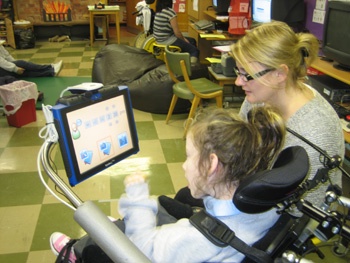Scottish scientists have developed the first technology of its kind in the world which allows children with communication difficulties to take control of conversations.
How was school today? is a software system which uses a combination of technologies to enable children with disabilities such as cerebral palsy and learning difficulties to have conversations in a faster, more interactive way.
The system is the result of a year long collaborative project between computing scientists from the Universities of Dundee and Aberdeen and Capability Scotland.
Dr Ehud Reiter, from the University of Aberdeen's School of Natural and Computing Sciences said: "How was school today?uses sensors, swipe cards, and a recording device to gather information on what the child using the system has experienced at school that day. This can then be turned into a story by the computer - using what is called natural language generation – which the pupils can then share when they get home.
"The system is designed to support a more interactive narration, allowing children to easily talk about their school day and to quickly answer questions."
This innovative project was funded by the Engineering and Physical Sciences Research Council (EPSRC) and pupils from Capability's Corseford School near Glasgow were the first to trial the new system.
Sue Williams, headteacher at Corseford said: "In the week we used the system we found it very useful to pupils, teachers, therapists and parents alike. It allows children to take control of the conversation without having to rely on help from us."
Rolf Black from the University of Dundee's School of Computing explained: "For a child with severe motor disabilities and limited or no speech, holding a conversation is often very difficult and limited to short one to two word answers.
"To tell a longer story a communication device is often needed to form sentences but this can be very time consuming, putting a lot of strain on holding and controlling the conversation."
Nicole Vallery and Rebecca Clelland were two of the pupils at Corseford to test the new software.
Nicole's mum, Jan, said: "We really enjoyed using How was school today? and hearing Nicole's story. The programme enabled her to talk easily and answer questions quickly, prompting more interaction and giving us a very detailed insight into her day."
Dr Annalu Waller from the University of Dundee's School of Computing added: "Relating daily experiences is an essential part of developing both language and personality. With How was school today? children are able to use computer generated language to share their own experiences in a more independent and natural way."
Plans are now in place to further evaluate the system to examine how it could be used to support children with different levels and types of impairments, and widened out to incorporate conversations around other themes.
After the promising results and overwhelming support at Corseford, the prototype is to be used with more children over a longer period of time. The pupils who have already trialled the technology are delighted to have the chance to test it again.
Rebecca said: "It was something different, I enjoyed it."
Nicole added: "I was happy to take part in How was school today? It made me feel good about myself."
ENDS


